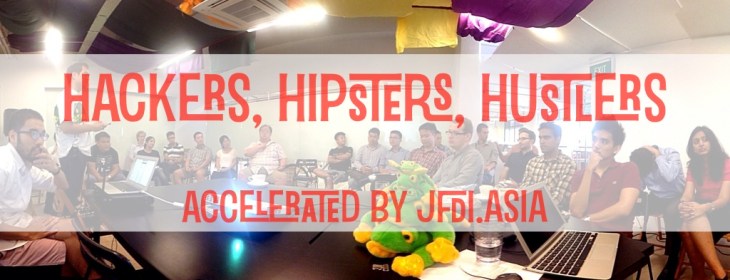JFDI Asia, the Singapore-based accelerator program, is doubling down its investment in early-stage startups and experimenting with allowing participants of its 100-day program to spend time away from its physical base.
The organization, which was founded in 2012 by former BBC producer Hugh Mason and entrepreneur Meng Weng Wong, said it will now provide an immediate SG$50,000 (US$37,000) investment for startups accepted into its twice-annual program. That covers an 8.88% share in each company, and is double its previous investment. JFDI Asia is also pledging to offer a further SG$70,000 (US$53,000) towards a follow-on seed round for “the most successful startups.”
Mason told TechCrunch that the increased funding comes in response to the development of Asia’s startup ecosystem over the past few years, and also for practical purposes.
“Valuations are going up, and we’re seeing more mature businesses,” he added, explaining that JFDI Asia is retaining the same amount of equity for its initial investment. “As for the follow-on money, we would like to be able to participate in seed rounds where teams are very successful.
“It typically takes our graduate companies three to five months to close a round once they leave our program. That initial SG$25k would get them through the program [and cover the cost living in Singapore], but then we found a lot were struggling to bridge the financial gap before they closed a round — giving them more security is important,” he further explained.
Higher Cost Of Living
Equally as interesting as the increased capital and valuations, JFDI Asia is experimenting with video and online-based learning and mentoring to enable teams to spend time participating in its program remotely.
Some of this, Mason explained, comes down to cost — life in Singapore is comparatively more expensive than other parts of Asia where most of the founders of startups accepted into the program are from.
Mason values the face-to-face element of accelerator programs above all else, though — “we’re not about to throw that away,” he said, pointing out that Singapore is Southeast Asia’s business and investment hub — but teams will be allowed to spend ‘some’ time away from JFDI Asia’s base. He admitted also that the organization, which he said regularly fields partnership requests from across Asia, may look into providing a “blended offline/online experience” and perhaps affiliate camps or programs in other markets in the future.
“It’s an experiment,” he said. “The truth is Singapore is very expensive.”
JFDI Asia’s move to incorporate remote elements came about after the organization embraced Slack, which has now replaced all internal email and other digital communication. Not only has it allowed JFDI Asia’s startups to increase their meaningful communication with each other, Mason said, but it enabled the organization itself to create a community to keep tabs on companies that applied but are not quite ready for its program.
“A 100-day program has a beginning, a middle, and an end,” Mason told us. “But if you run a marathon you do pre-event training and keep in touch with those you ran with — similarly, social media allows us to extend the period that we’re in touch with companies both before and after, which makes the 100 days more effective.”
JFDI Asia has seen more than 50 startups graduate from its program. Some of its most notable alumni includes TradeGecko, which recently raised a $6.5 million Series A, Flocations, which was acquired by Japan’s VRG, and medical/health startups Healint and OurHealthMate.
The organization is currently taking applications for its next 100-day program, which is scheduled for the third quarter of 2015.
